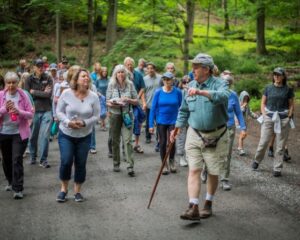Interviewee: Malcolm P. Crooks
Date of birth/age at interview: May 17, 1923/87
Interviewer: Chase Asplundh, Linda Metcalf
Interview date: November 20, 2010
Interview location: Crook’s home at Tuckamony Farm in Solebury
Interview length: 45 minutes
Time span discussed: 1920s through 2010
Summary: This is an overview of Malcolm’s life including many insights into Solebury before and after World War II. He gives details of his family’s activities over many years. Vivid pictures of America emerge through Malcolm’s recounting the various jobs it took to get along and the work of a conscientious objector during World War II. His land preservation and conservation efforts have helped shape a community that has been able to retain its rural qualities and are modestly discussed by this community leader.
Time markers:
00:05 – circumstances of his birth, cost of hospital
01:22 – mother’s role; work around the home, particularly his mother’s many tasks
03:43 – father (Forrest C. Crooks) artist and farmer; begins the Christmas tree farm
04:31 – tasks of the brothers on the farm; many trees on farm died; brother Corydon working for George Nakashima
06:27 – sold first Christmas trees 1932 for 65 cents
06:47 – early interest in birds, trees, conservation
08:29 – schooling at Solebury one-room school house, Solebury Elementary, Buckingham Friends for 8th grade, George School, and Guilford College; Dr. Tom Richie teacher, then doctor
10:51 – three children with wife Marjorie
11:55 – war years, conscientious objector (CO) working in Tennessee
14:17 – impact of working as CO in former CCC camp on his conservation thinking
15:27 – service in Virginia for Weather Bureau
16:29 – more CO work Patuxent Research Refuge
17:35 – service complete, enrolled at Iowa State; West Virginia Wildlife Department
17:58 – recounts Solebury town history, general store with detailed description of the store’s many activities
20:05 – lack of restaurants in Solebury; social differences in Solebury; general store now post office
21:50 – Solebury community starts food co-op; president of co-op
24:45 – land management association, primarily interested in watersheds
25:35 – power line and Route 202 proposals in late 1960s; opposed the desecration of the Honey Hollow watershed, successful battle to preserve the watershed
28:51 – Honey Hollow Watershed Association, Environmental Education Center, and the Audubon Society, prospering still 40 years later
31:11 – personal life, jobs to get though travels and college; Fuller Brush salesman
35:39 – taxi driver and waiter; “Great to be poor, incentive to do things”
37:54 – Solebury zoning ordinances, working with Bill Tinsman, Jr., land preservation committee
40:45 – Where is Solebury going? water main issue
43:17 – final insights


